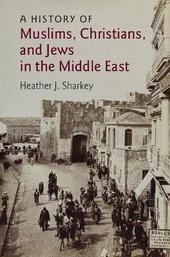
|
A History of Muslims, Christians, and Jews in the Middle East
Hardback
Main Details
| Title |
A History of Muslims, Christians, and Jews in the Middle East
|
| Authors and Contributors |
By (author) Heather J. Sharkey
|
| Series | The Contemporary Middle East |
|---|
| Physical Properties |
| Format:Hardback | | Pages:392 | | Dimensions(mm): Height 235,Width 157 |
|
| Category/Genre | Interfaith relations
History of religion |
|---|
| ISBN/Barcode |
9780521769372
|
| Classifications | Dewey:200.956 |
|---|
| Audience | | Undergraduate | | Postgraduate, Research & Scholarly | |
|---|
| Illustrations |
18 Halftones, black and white
|
|
Publishing Details |
| Publisher |
Cambridge University Press
|
| Imprint |
Cambridge University Press
|
| Publication Date |
3 April 2017 |
| Publication Country |
United Kingdom
|
Description
Across centuries, the Islamic Middle East hosted large populations of Christians and Jews in addition to Muslims. Today, this diversity is mostly absent. In this book, Heather J. Sharkey examines the history that Muslims, Christians, and Jews once shared against the shifting backdrop of state policies. Focusing on the Ottoman Middle East before World War I, Sharkey offers a vivid and lively analysis of everyday social contacts, dress, music, food, bathing, and more, as they brought people together or pushed them apart. Historically, Islamic traditions of statecraft and law, which the Ottoman Empire maintained and adapted, treated Christians and Jews as protected subordinates to Muslims while prescribing limits to social mixing. Sharkey shows how, amid the pivotal changes of the modern era, efforts to simultaneously preserve and dismantle these hierarchies heightened tensions along religious lines and set the stage for the twentieth-century Middle East.
Author Biography
Heather J. Sharkey is an Associate Professor in the Department of Near Eastern Languages and Civilizations at the University of Pennsylvania. She is the author of Living with Colonialism: Nationalism and Culture in the Anglo-Egyptian Sudan (2003) and American Evangelicals in Egypt: Missionary Encounters in an Age of Empire (2008).
Reviews'A captivating profile of the religious diversity in the Middle East that has been driven to the brink of extinction in the century since the fall of the Ottoman Empire. A brilliant and essential history for understanding the tragedy of intolerance in the Arab world today.' Eugene Rogan, University of Oxford 'In this book, Heather J. Sharkey is not afraid to tackle major historical questions that are still relevant today: religion as an explanatory factor in history, the question of violence and religious liberty in Islam, the possibility of shared public spaces and secular culture. The originality of her work comes from her attention to the sensory experiences of historical actors and of the reader, in using images, clothes, foods and sounds as historical sources. Thus she invites us to reconsider the relationship between Muslims, Jews and Christians, on the basis of their everyday life.' Bernard Heyberger, Ecole des Hautes Etudes en Sciences Sociales, Paris 'Heather J. Sharkey provides a remarkable study of Muslim-Christian-Jewish relations in history that does not ignore the conflicts but also presents in-depth insights into day-to-day intercommunal relations. Her discussion of interreligious relations at the level of ordinary 'mundane' life adds a vital dimension to our understanding this subject. Sharkey's study makes a significant contribution generally to scholarship on pluralism and diversity in world history as well as specifically contributing to the understanding of cultural-religious-political history of the Middle East.' John Voll, Georgetown University, Washington, DC 'Heather Sharkey's nuanced, complex, and unique book stands out because of her focus on a much larger geographical area (the Ottoman Empire, with occasional references to Iran and Morocco), as well as a longer historical timeframe (the 7th through early 20th centuries, with a focus on the Ottoman period). Moreover, she clearly weaves together three distinct analytical approaches: the theological, the political, and the social. By examining each of these elements of Ottoman society, Sharkey illuminates both Ottoman policies and the practices of Ottoman subjects. These features mark this text as an important standard for decades to come.' Noah Haiduc-Dale, Journal of Church and State
|